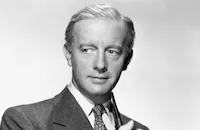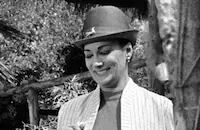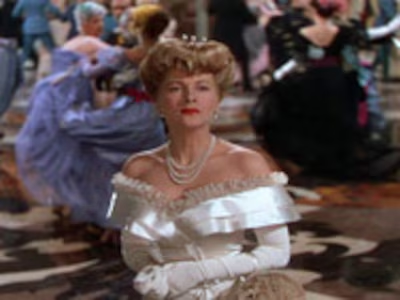The Emperor Waltz
Brief Synopsis
Cast & Crew
Billy Wilder
Bing Crosby
Joan Fontaine
Roland Culver
Lucile Watson
Richard Haydn
Film Details
Technical Specs

Synopsis
In turn-of-the-century Vienna, an American crashes a ball at the emperor's palace in pursuit of a beautiful Austrian countess, who rebuffs him. As members of the aristocracy look on, one tells the story of the countess and the American's recent love affair: Phonograph salesman Virgil H. Smith, an amateur drummer from New Jersey, hopes to sell his "talking machine" to Emperor Franz Joseph I, whose endorsement would persuade many Austrians to purchase the product. Before he can see the emperor, however, he is tossed out by palace guards who think his phonograph is a bomb. Meanwhile, in the emperor's chambers, the Countess Johanna Augusta Franziska von Stoltzenberg-Stolzenberg and her bankrupt father, Baron Holenia, are thrilled to hear that their black pedigreed poodle, "Scheherezade," has been chosen to mate with the emperor's own poodle. As they leave the palace, they encounter Virgil, whose fox terrier mutt "Buttons" sniffs Scheherezade and thus provokes both a bloody dogfight and a heated argument about class relations. The antagonists meet again in the Austrian Tyrol, where Virgil plans to ambush the emperor's hunting party in order to make his sales pitch. Johanna, angry after another scuffle between Buttons and Scheherezade, arranges to have Virgil deported. When Scheherezade suffers a nervous breakdown, however, the countess is forced to seek Virgil's aid. Scheherezade is then treated by a veterinarian who attended the University of Vienna with Sigmund Freud, and advises that the poodle should be made to confront Buttons in order to dispel her fear. When the dogs are brought together, both the animals and their owners begin to fall in love. In the next two weeks, during which Scheherezade is officially mated with the royal black poodle, Virgil, Johanna, and their pets share many secret rendezvous on a romantic island. Virgil gradually convinces a skeptical Johanna that their love can overcome class differences, and asks the emperor for her hand in marriage. The emperor, doubting that Johanna could remain happy living in Virgil's mother's Newark duplex, tells Virgil he will endorse the phonograph if Virgil gives up Johanna. Deciding that the emperor is right about their differences, Virgil breaks the engagement and tells Johanna he was only using her to gain the emperor's favor in the phonograph deal. On the night of the ball, Scheherezade gives birth to a litter of white puppies with black patches--clearly the offspring of Buttons. The countess' opportunistic father, fearful of losing royal favor, orders the puppies drowned and tells the emperor they were stillborn. Virgil, who has crashed the ball in order to make up with Johanna, rescues the puppies, shows them to the emperor, and defends the worthiness of himself and Buttons. The emperor agrees to let Virgil and Johanna marry if they will let him keep the puppies.

Director

Billy Wilder
Cast

Bing Crosby

Joan Fontaine

Roland Culver

Lucile Watson

Richard Haydn

Harold Vermilyea
John Goldsworthy

Sig Ruman
Julia Dean
Bert Prival
Alma Macrorie
Roberta Jonay
James Vincent
Harry Allen
Eleanor Tennant
Vesey O'davoren
Norbert Schiller
Frank Elliott
Paul De Corday
Jack Gargan

Doris Dowling
Renee Randall
Jean Marshall
Kay Young
Len Hendry
Cyril Delevanti
James Carlisle
Frank Mayo
Hans Moebus
Albert Petit
Albert Pollet
Count Stefenelli
Franco Corsaro
Jerry James
William Meader
Gene Ashley
John "skins" Miller
Jac Lucas Fisher
Leo Lynn
Bob Stephenson
James Logan
Crew
Franz Bachelin
George Barnes
Charles Brackett
Charles Brackett
Robert Brower
Hugh Brown
Malcolm Bulloch
Johnny Burke
C. C. Coleman Jr.
Sam Comer
Stanley Cooley
John Cope
Billy Daniels
Hans Dreier
Farciot Edouart
Paul Elbogen
Ralph Erwin
Doane Harrison
Doane Harrison
Edith Head
Ed Henderson
Richard Heuberger
Paul Huldschinsky
Frank Inn
Gordon Jennings
Natalie Kalmus
Joseph J. Lilley
Ronnie Lubin
Arthur Pryor
G. E. Richardson
Fritz Rotter
Troy Sanders
Gile Steele
Oliver C. Stratton
Johann Strauss Ii
Eleanor Tennant
Fred True
James Van Heusen
Wally Westmore
Billy Wilder
Major Jim Wood
Lothrop Worth
Victor Young

Videos
Movie Clip



Film Details
Technical Specs

Award Nominations
Best Costume Design
Best Costume Design
Best Score
Articles
The Emperor Waltz
Wilder was being unduly harsh on himself. Atypical the film may be, but it received good reviews at the time and is still regarded as a charming and witty little gem. It's a light romantic musical farce about a traveling American phonograph salesman, Virgil Smith (Bing Crosby), who in 1901 crashes the court of Austrian Emperor Franz Joseph (Richard Haydn), seeking the emperor's endorsement. During the ensuing complications, Virgil and his dog fall in love with a countess (Joan Fontaine) and her poodle.
Wilder was strongly in the mood to make a light tale such as this because he had just come off of directing two dark, dramatic features -- Double Indemnity (1944) and The Lost Weekend (1945) -- as well as the documentary short Death Mills (1945), a record of the Nazi concentration camps. That short was filled with horrific images of the camps and had been tough for Wilder to get through. As he later told Cameron Crowe, "I was very eager to do something on the more frivolous side... I kind of thought it would be fun to make a musical." In a meeting with the Paramount front office, an executive mentioned that they didn't have a picture at the moment for Bing Crosby. Wilder immediately jumped in and said he would like to do a musical with the star.
Wilder and Charles Brackett fashioned an original screenplay, and lyricist Johnny Burke was brought on to write a handful of charming songs, including "The Kiss in Your Eyes," "Get Yourself a Phonograph," and "Friendly Mountains," the latter an interesting mash-up of two old Austrian yodel songs. Crosby also sings the popular oldie "I Kiss Your Hand, Madame," which he first recorded in 1929.
Wilder had some creative clashes with Bing Crosby and that is probably a reason that Wilder didn't remember the picture too fondly. Crosby brought in his own writers to rewrite his dialogue even though Wilder and Brackett were two of the best writers in town -- a sign of Crosby's immense power as a major star. It's likely that the original script was more hard-edged and satirically biting, and that Crosby softened it, at least as far as his character was concerned. (One scene that remains quite Wilder-esque concerns Sig Ruman as a doctor analyzing a dog.)
For the female lead, Paramount tried to entice Greta Garbo out of retirement, to no avail. Joan Fontaine was borrowed instead from David Selznick. Selznick had loaned Fontaine out more often than he had used her in his own films. For The Emperor Waltz, he charged Paramount $300,000 and of that amount, Fontaine got only $75,000 minus her agent's commission. This was the last film for Fontaine under her Selznick contract. Afterwards she signed a contract with her new husband, producer William Dozier, whom she had married just before production. (He was the second of her four husbands.) Her next two films -- both of which were released before The Emperor Waltz -- were Ivy (1947) and Letter from an Unknown Woman (1948). That latter film, a masterpiece directed by Max Ophuls, is also set in turn-of-the-century Vienna.
For The Emperor Waltz, Fontaine agreed to take second billing to Bing Crosby -- the first time in four years she had not had top billing. In later years she, like Wilder, was not crazy about this film, writing in her memoir: "Crosby was pleasant to work with, but I felt I scarcely knew him when the picture was finished. The results looked like it." In 1965, Fontaine would work with Crosby once again on an episode of his TV show.
The Emperor Waltz was well received, with The New York Times declaring: "Brackett and Wilder have made up with casualness and charm -- and with a great deal of clever sight-humor -- for the meagerness of the idea... Fontaine turns in a sweet job of farce." Variety said "The dialog has zing, the pace is zippy and the results well worth 105 minutes of theatre time."
The film received two Oscar® nominations, for Best Color Costume Design (Edith Head and Gile Steele), and Best Score of a Musical Picture (Victor Young). It lost those awards to Joan of Arc (1948) and Easter Parade (1948), respectively.
The Emperor Waltz was shot on location in Jasper National Park, Canada.
Producer: Charles Brackett Director: Billy Wilder
Screenplay: Charles Brackett, Billy Wilder
Cinematography: George Barnes
Art Direction: Franz Bachelin, Hans Dreier
Music: Victor Young
Cast: Bing Crosby (Virgil Smith), Joan Fontaine (Johanna Augusta Franziska), Roland Culver (Baron Holenia), Lucile Watson (Princess Bitotska), Richard Haydn (Emperor Franz-Josef), Harold Vermilyea (Chamberlain), Sig Ruman (Dr. Zwieback), Julia Dean (Archduchess Stephanie), Bert Prival (Chauffeur), Alma Macrorie (Inn Proprietress).
C-106m.
by Jeremy Arnold
Sources:
Barbara Bauer, Bing Crosby
Cameron Crowe, Conversations With Wilder
Marsha Lynn Beeman, Joan Fontaine: A Bio-Bibliography
Robert Bookbinder, The Films of Bing Crosby
Joan Fontaine, No Bed of Roses
Charles Thompson, Bing

The Emperor Waltz
TCM Remembers - Billy Wilder
Billy Wilder had the most deliciously dirty mind in Hollywood. The director dug into racy, controversial subjects with cynical wit and rare candor; he set new standards for film noir, sex comedies and the buddy film and his movies continue to inspire new generations of filmmakers.
Cameron Crowe, screenwriter and director of contemporary hit films such as Jerry Maguire(1996), was one of those moved by Wilder's film sense. The struggling filmmaker struck up a friendship with the 93-year old veteran and found a friend and a mentor. Their conversations were recently chronicled in a book by Cameron Crowe entitled Conversations with Wilder(published by Knoft).
Billy Wilder might have been born in Vienna, but American culture influenced him from the earliest days. Given the name Samuel, Wilder's mother called her son 'Billy' in honor of Buffalo Bill Cody. The name stuck.
Billy was as restless as his namesake and left law school to become a journalist. While grinding out articles for a Berlin newspaper, Wilder joined with future film directors Fred Zinnemann, Robert Sidomak and Edgar G. Ulmer to make a short film, Menschen Am Sonntag (1929). By the mid-1930s, he had written seven scenarios and even tried his hand at directing. After Hitler's rise to power in 1934, Wilder fled his homeland. Once in Hollywood, Wilder and roommate Peter Lorre had to learn English quickly if they wanted to join the American film industry. Together the German expatriates learned the language and began staking their territory in the Dream Factory.
As a writer, Wilder could craft realistic relationships with sharp dialogue; he proved this in his scripts for Ninotchka (1939) with Greta Garbo and Howard Hawks' Ball of Fire(1941). As a filmmaker, Wilder was well acquainted with the shadowy, brooding style of German Expressionism. He brought these two gifts together to create a landmark film noir - DOUBLE INDEMNITY(1944). He followed this cinematic triumph with a risky project, the story of an alcoholic on a three-day binge. Not the usual subject matter for a Hollywood studio, THE LOST WEEKEND (1945) nevertheless claimed the Academy Award for Best Picture. By the end of the decade, Wilder dared even to paint a portrait of Hollywood stardom gone awry in Sunset Boulevard (1950).
Each of these films is an undisputed classic today, but even at the time, his films were lauded. Six of his screenplays were nominated for Oscars between 1941-1950. Three of his eight Best Director nominations also came during this period. Billy Wilder claimed the American Dream; he was successfully playing by his own rules.
By the end of the '50s, as censorship guidelines were easing, Wilder's projects became even more daring. Sex was central to Wilder's world and Hollywood celebrated his candor. He directed Marilyn Monroe in two of her most sensuous roles, The Seven Year Itch (1955) and SOME LIKE IT HOT(1959). More often than not, Wilder liked pointing his finger at the hyprocrisy of people's sexual mores. In THE APARTMENT(1960), Wilder took an incisive look at corrupt businessmen exploiting their employees for sexual favors. In IRMA LA DOUCE (1963), the world of a Parisian prostitute was lovingly painted in Technicolor tones. In Kiss Me, Stupid (1964), Wilder finally stepped over the line with the story of a struggling composer willing to offer his wife to sell a song.The film, which seems so innocent today, was scandalous in its own day. Critics called Kiss Me, Stupid pornographic smut and buried the picture. Audiences ignored it. Today, the film is a risque farce with great performances by Dean Martin and Kim Novak. The critical lambast deeply affected Wilder; this would be his last sex comedy.
In 1966 Wilder brought together the dynamic combination of Jack Lemmon and Walter Matthau with THE FORTUNE COOKIE. Director and stars teamed again for The Front Page (1974), a remake of the newspaper classic; and Buddy, Buddy (1981), the story of an assassin and a sad sack ready to commit suicide.
Wilder's many years in Hollywood produced an amazing string of hits. From sarcastic and cynical social commentary to outrageous sex farce, Wilder pushed his audiences to look at their own values and morals. He was an outsider who wasn't afraid to point out the follies of his fellow man or the worst aspects of American culture. He will be sorely missed.
By Jeremy Geltzer
TCM Remembers - Billy Wilder
Doris Dowling (1923-2004)
Doris Dowling was born on May 15, 1923 in Detroit, Michigan. She showed an interest in acting at a young age, and after a few years of stage work in the Midwest, she joined her older sister, the leading lady Constance Dowling, in Hollywood. Paramount soon took notice of the sultry brunette with the soulful expression and husky voice, and promptly signed her to a contract.
She made a stunning film debut as Gloria, the hooker who befriends Ray Milland at a bar, becoming his good-humored confidante in The Lost Weekend (1945); she followed that up in the overlooked, film noir gem, The Blue Dahlia (1946), playing Alan Ladd's shrewish wife before being killed by a mystery killer in the first reel. She made another noir thriller, the forgettable, The Crimson Key (1947), playing, once again, an unsympathetic part before heading off to Europe. Once there, Italian director Giuseppe de Santis used her effectively in Bitter Rice (1948), arguably her best performance as the jewelry thief hiding among women rice workers in Northern Italy; another notable role was as Bianca in Orson Welles' French production of Othello (1951).
She returned to Hollywood in the late '50s, and spent the next three decades doing television work: Bonanza, Perry Mason, Alfred Hitchcock Presents, Barnaby Jones, and The Streets of San Francisco, just to name a few. She retired quietly from acting by the early '80s. She was briefly married to bandleader Artie Shaw (1952-56), and is survived by her son through that marriage, Jonathan; and her husband of 44 years, Leonard Kaufman.
by Michael T. Toole
Doris Dowling (1923-2004)
Quotes
Trivia
The film takes place in the Alps but was actually filmed at Jasper National Park in Canada. Billy Wilder spent $20,000 to have pine trees sent from California and planted on location because he was not satisfied with the Canadian pine trees; he also planted 4,000 daisies that were painted blue because he felt white daisies did not photograph well.
Notes
Although official Paramount billing gives this film's running time as 103 min., contemporary and modern sources also list it as 105 or 106 min. The film's working title was Viennese Story. According to a Hollywood Reporter news item, editor Doane Harrison took over direction for a few days while Billy Wilder underwent minor surgery. Hollywood Reporter reported that the film cost over four million dollars to make. Paramount News reported the following information about the production: Oscar Karlweis was initially chosen to play the role of the emperor, but was later replaced. The studio-constructed Emperor Island, where "Virgil" woos "Johanna," was made of earth, rock and trees and placed on a wooded platform and floated on oil drums in Leach Lake in Alberta, Canada's Jasper National Park, where some of the film was shot on location. The island was ceremoniously turned over to the Dominion of Canada before the film crew left, and was rebuilt in Paramount's Hollywood studios for additional scenes. The rowboat used by Crosby to row out to the island was a "plaette," an eighteen-foot gondola-like boat used on the lakes of the Austrian Tyrol in the early 1900s.
According to a Paramount studio press release, use of all-black dogs in the film was innovative because heretofore black objects appeared too dark when filmed in Technicolor; the dogs were adorned with ribbons and were powdered before each shot. As reported in Liberty magazine, the film's dog stars, "Scheherezade" and "Buttons," were owned by the Weatherwax brothers of Hollywood, who also owned the famous motion picture collie "Lassie." Bing Crosby's Beverly Hills tennis court was used for the film's tennis scenes. Eleanor Tennant, who appeared as a tennis player, was a Beverly Hills Tennis Club pro, and supervised the tennis scenes. Paramount publicized the film as Bing Crosby's first love story (although he had appeared in a number of "love" stories prior to this) and Brackett and Wilder's first musical. Joan Fontaine was borrowed from RKO Studios to appear in the picture. The film was nominated for an Academy Award for Best Costume Design (color), Edith Head and Gile Steele; and for Best Music (scoring a musical picture), Victor Young.

Miscellaneous Notes
Released in United States Summer July 2, 1948
Released in United States Summer July 2, 1948













